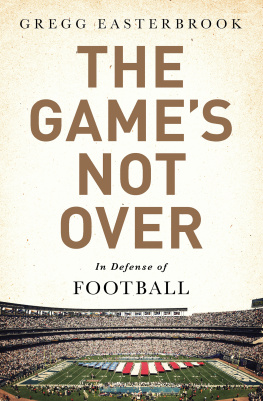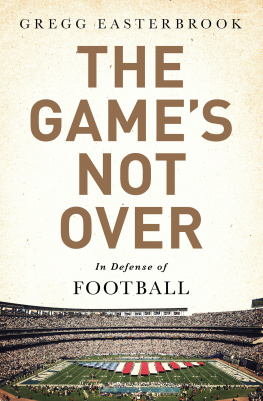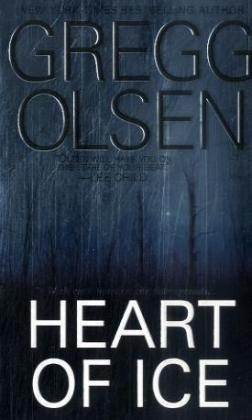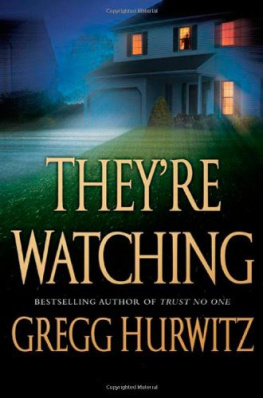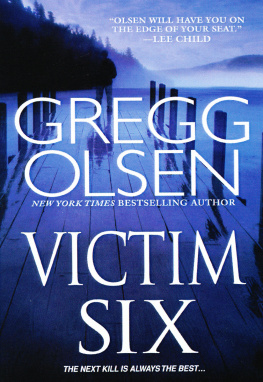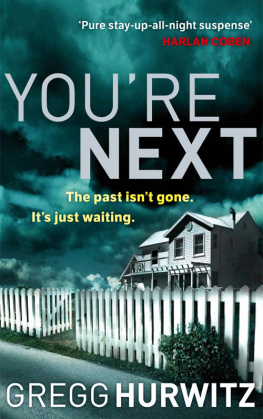Gregg Easterbrook - The Blue Age
Here you can read online Gregg Easterbrook - The Blue Age full text of the book (entire story) in english for free. Download pdf and epub, get meaning, cover and reviews about this ebook. year: 2021, publisher: PublicAffairs, genre: History. Description of the work, (preface) as well as reviews are available. Best literature library LitArk.com created for fans of good reading and offers a wide selection of genres:
Romance novel
Science fiction
Adventure
Detective
Science
History
Home and family
Prose
Art
Politics
Computer
Non-fiction
Religion
Business
Children
Humor
Choose a favorite category and find really read worthwhile books. Enjoy immersion in the world of imagination, feel the emotions of the characters or learn something new for yourself, make an fascinating discovery.

- Book:The Blue Age
- Author:
- Publisher:PublicAffairs
- Genre:
- Year:2021
- Rating:5 / 5
- Favourites:Add to favourites
- Your mark:
- 100
- 1
- 2
- 3
- 4
- 5
The Blue Age: summary, description and annotation
We offer to read an annotation, description, summary or preface (depends on what the author of the book "The Blue Age" wrote himself). If you haven't found the necessary information about the book — write in the comments, we will try to find it.
The Blue Age — read online for free the complete book (whole text) full work
Below is the text of the book, divided by pages. System saving the place of the last page read, allows you to conveniently read the book "The Blue Age" online for free, without having to search again every time where you left off. Put a bookmark, and you can go to the page where you finished reading at any time.
Font size:
Interval:
Bookmark:
This Magic Moment
Surgeon Koop
A Moment on the Earth
Beside Still Waters
Tuesday Morning Quarterback
The Here and Now
The Progress Paradox
Sonic Boom
The Leading Indicators
The King of Sports
The Games Not Over
Its Better Than It Looks
Copyright 2021 by Gregg Easterbrook
Cover design by Pete Garceau
Cover photograph Mikhail Makarov/Dreamstime.com
Cover copyright 2021 by Hachette Book Group, Inc.
Hachette Book Group supports the right to free expression and the value of copyright. The purpose of copyright is to encourage writers and artists to produce the creative works that enrich our culture.
The scanning, uploading, and distribution of this book without permission is a theft of the authors intellectual property. If you would like permission to use material from the book (other than for review purposes), please contact permissions@hbgusa.com. Thank you for your support of the authors rights.
PublicAffairs
Hachette Book Group
1290 Avenue of the Americas, New York, NY 10104
www.publicaffairsbooks.com
@Public_Affairs
First Edition: September 2021
Published by PublicAffairs, an imprint of Perseus Books, LLC, a subsidiary of Hachette Book Group, Inc. The PublicAffairs name and logo is a trademark of the Hachette Book Group.
The Hachette Speakers Bureau provides a wide range of authors for speaking events. To find out more, go to www.hachettespeakersbureau.com or call (866) 376-6591.
The publisher is not responsible for websites (or their content) that are not owned by the publisher.
Library of Congress Cataloging-in-Publication Data
Names: Easterbrook, Gregg, author.
Title: The blue age : how the US Navy created global prosperityand why were in danger of losing it / Gregg Easterbrook.
Other titles: How the US Navy created global prosperityand why were in danger of losing it
Description: First edition. | New York : PublicAffairs, 2021. | Includes bibliographical references and index.
Identifiers: LCCN 2021016411 | ISBN 9781541742543 (hardback) | ISBN 9781541742550 (epub)
Subjects: LCSH: Sea-powerUnited StatesHistory21st century. | United States. NavyHistory21st century. | Trade routesHistory21st century. | ShippingUnited StatesHistory21st century. | United StatesHistory, Naval.
Classification: LCC VA58 .E27 2021 | DDC 359/.030973dc23
LC record available at https://lccn.loc.gov/2021016411
ISBNs: 978-1-5417-4254-3 (hardcover), 978-1-5417-4255-0 (ebook)
E3-20210809-JV-NF-ORI
to Ben Adams
who believes in books
vita excolatur
To multiply the harbors does not reduce the sea.
E MILY D ICKINSON , 1871

WAVES SLAP AGAINST THE HULLS OF CARAVELS ON AN INKY night, ships tracking each other via lookouts who watch for wakes and listen for the creak of wood against water. Commanders of the Portuguese fleet waited for a crescent moon so they could enter the Strait of Malacca in near darkness. Sailors whisper, knowing they will be punished for loud talking. Sound carries on a flat seashould anyone on deck shout up toward the lateens, the cries might be overheard along the shores of this narrow passage.
Some of the sailors are nervous, knowing that within a few hours they may be dead or bellowing in agony as a surgeon hacks off a smashed limb. Others are eager to fight. The coming battle will afford the chance to win and return home in glory, claiming the reward promised by the thronegold sufficient for a mere sailor to enter a gentlemans life of ease.
A navigator consults the heavens. He locates the bright star Canopus, known as Suhail to Islamic astronomers of old; measures the apparent distance from Canopus to other named stars by holding up his hand and using the knuckle of this thumb as a scale. The navigator consults a Chinese map many men died to obtain. He informs the captain their small fleet will reach the Sultanate of Malacca before daybreak. The captain orders marines to dress for combat.
The voyage from Portugal to the Strait of Malacca was timed to variations of ocean currents, which appear to mariners as colored rivers in the vastness of the water world, and to monsoon winds whose direction varies with the season.
The Portuguese have come from Lisbon, all the way down the west coast of Africa, around Cape Agulhas at the foot of the continent that is a mystery to Castile, to Kochi on the west of India, then across the Indian Ocean.
Merely reaching the location for the battle has been expensive, exhausting, perilous. Sailors died en route, and combat survivors will die on the voyage home, if there is such a voyage. From the start everyone knew that if half the complement ever saw Lisbon Cathedral again, the quest would be blessed of God.
The year is 1511, and these are not the first wooden ships to endure the hardship of a transit from Europe to what was then called the Orient. In 1498, Vasco da Gama was the first European to sail to India. By 1511, Spanish, Dutch, and other vessels have made the passage. Not long after 1511, Ferdinand Magellan would organize ships for the initial circumnavigation of our pale blue dot. Five carracks with 260 men departed Seville. Three years passed. A single vessel, with 18 mena skeleton crew in more ways than onereturned to Seville. Their ships log was one day behind, confirming the disputed notion that there existed an international date line.
In 1511 there will be war along the Strait of Malacca, a complicated multiple-party combat among the Portuguese, the local sultanate, the Dutch, the Ming Chinese, and the Venetians. Portugal will prevail, taking control of a water highway thousands of miles from home.
Those aboard local junks that ply the Strait of Malacca do not know of Lisbons approaching fleet. Determining the specific location of ships at sea was a 3,000-year-old puzzle, from the Phoenicians through the late Cold War, solved only in the current generation by satellites and transponders. The instant locals sense a fight coming, they will race their junks to the nearest anchorage. When warships appear, most of what floats ends up sinking, including most of the warships.
For many centuries a trip down the Strait of Malacca was hazardous: pirates, boarding parties, armed ships of shoguns and royals were a constant danger because the water road between West and East ran through this contested channel, just as the water road to Athens of antiquity ran through the narrow channel at Artemisium.
Age-old kingdoms fought over the strait; navies of Renaissance Europe and Middle China fought over the strait; England devoted a hefty share of its collective wealth to establishing a fortress city at Singapore, to control the Asian entrance to the strait. In 1945 a powerful battle cruiser, Haguro, erred by steering into the Strait of Malacca. Soon the 927 men of the crew had gone to meet their ancestors.
THAT WAS THE STRAIT of Malacca in the past, war-torn and treacherous. Today the primary danger in these waters is collision caused by traffic.
The Strait of Malacca now suggests a Los Angeles freeway at rush hour, nearly as packed with ships as Interstate 5 is packed with cars. Now a lookout in the strait would observe reflecting off rippling waves in every direction the red, green, and white strobe beacons of merchant vessels. A warship would track the navigation beacons of dozens of large container ships, in addition to electronic signatures of tourist vessels, fishing boats, ferries, and privately owned yachts. The Strait of Malacca has become the busiest sea lane in the world, bearing more traffic than does the Strait of Hormuz, near the Persian Gulf. Nearly a third of international trade passes through the slender channel of the old Malaccan Sultanate, more than the share of trade traversing any other strait in the world. And today the Strait of Malacca has been peaceful for two full generations.
Font size:
Interval:
Bookmark:
Similar books «The Blue Age»
Look at similar books to The Blue Age. We have selected literature similar in name and meaning in the hope of providing readers with more options to find new, interesting, not yet read works.
Discussion, reviews of the book The Blue Age and just readers' own opinions. Leave your comments, write what you think about the work, its meaning or the main characters. Specify what exactly you liked and what you didn't like, and why you think so.

